Reflective Journal on Case Management: Steps, Referral, and Advocacy
VerifiedAdded on 2023/03/30
|5
|1288
|365
Journal and Reflective Writing
AI Summary
This reflective journal provides insights into the core concepts, principles, and values of case management as learned through a healthcare course. The journal covers topics such as case management principles, effective communication, case management processes, screening and assessment, planning and care coordination, referral and advocacy, integrated service delivery, capacity building, record keeping, and ethical standards. The student reflects on various activities, including role-playing and case study discussions, which enhanced their understanding of the material. The journal also highlights the importance of ethical considerations and the role of case managers in maintaining professional standards, offering a comprehensive overview of essential aspects of case management practice. Desklib offers a repository of similar assignments and past papers to aid students in their studies.
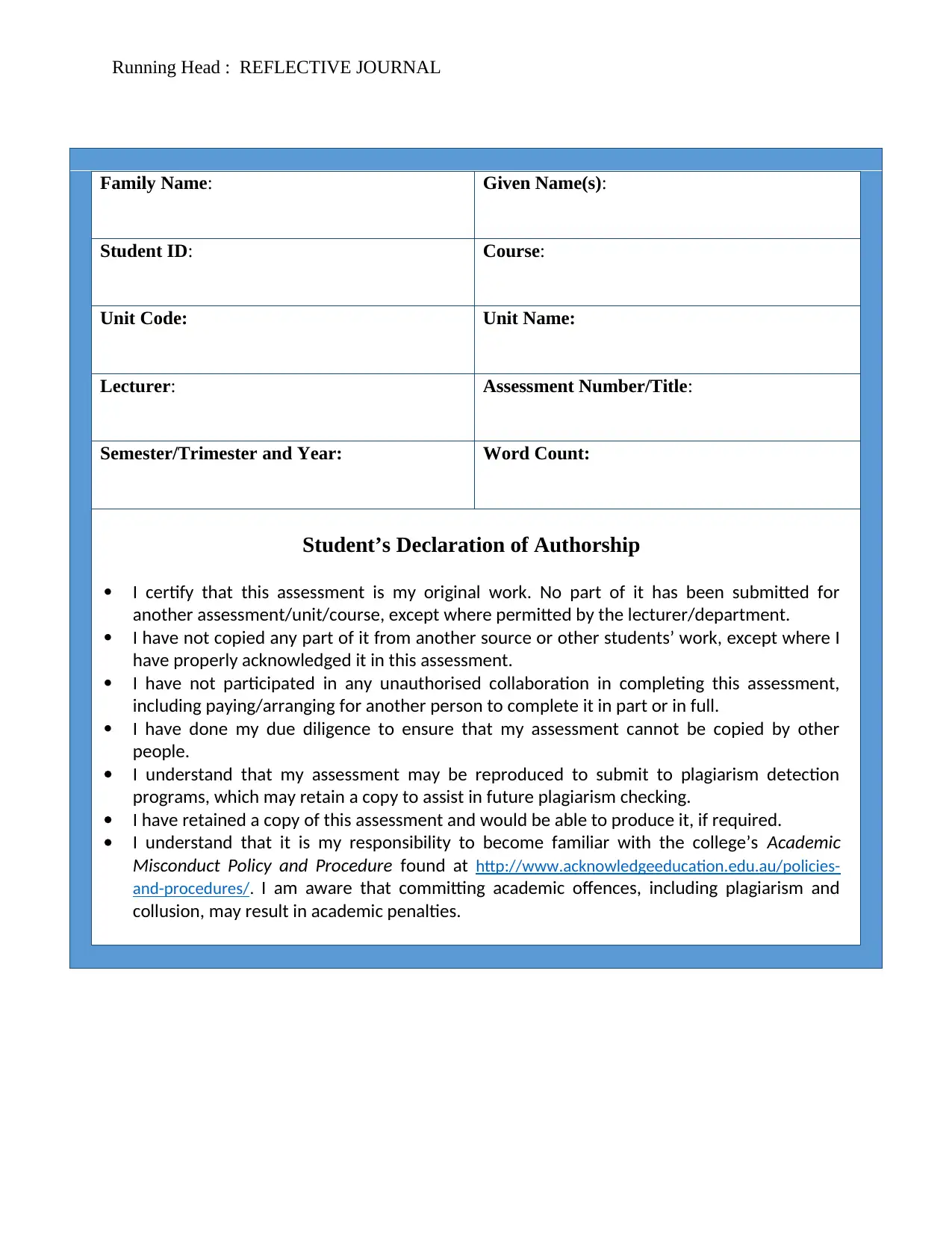
Running Head : REFLECTIVE JOURNAL
Family Name: Given Name(s):
Student ID: Course:
Unit Code: Unit Name:
Lecturer: Assessment Number/Title:
Semester/Trimester and Year: Word Count:
Student’s Declaration of Authorship
I certify that this assessment is my original work. No part of it has been submitted for
another assessment/unit/course, except where permitted by the lecturer/department.
I have not copied any part of it from another source or other students’ work, except where I
have properly acknowledged it in this assessment.
I have not participated in any unauthorised collaboration in completing this assessment,
including paying/arranging for another person to complete it in part or in full.
I have done my due diligence to ensure that my assessment cannot be copied by other
people.
I understand that my assessment may be reproduced to submit to plagiarism detection
programs, which may retain a copy to assist in future plagiarism checking.
I have retained a copy of this assessment and would be able to produce it, if required.
I understand that it is my responsibility to become familiar with the college’s Academic
Misconduct Policy and Procedure found at http://www.acknowledgeeducation.edu.au/policies-
and-procedures/. I am aware that committing academic offences, including plagiarism and
collusion, may result in academic penalties.
Family Name: Given Name(s):
Student ID: Course:
Unit Code: Unit Name:
Lecturer: Assessment Number/Title:
Semester/Trimester and Year: Word Count:
Student’s Declaration of Authorship
I certify that this assessment is my original work. No part of it has been submitted for
another assessment/unit/course, except where permitted by the lecturer/department.
I have not copied any part of it from another source or other students’ work, except where I
have properly acknowledged it in this assessment.
I have not participated in any unauthorised collaboration in completing this assessment,
including paying/arranging for another person to complete it in part or in full.
I have done my due diligence to ensure that my assessment cannot be copied by other
people.
I understand that my assessment may be reproduced to submit to plagiarism detection
programs, which may retain a copy to assist in future plagiarism checking.
I have retained a copy of this assessment and would be able to produce it, if required.
I understand that it is my responsibility to become familiar with the college’s Academic
Misconduct Policy and Procedure found at http://www.acknowledgeeducation.edu.au/policies-
and-procedures/. I am aware that committing academic offences, including plagiarism and
collusion, may result in academic penalties.
Paraphrase This Document
Need a fresh take? Get an instant paraphrase of this document with our AI Paraphraser
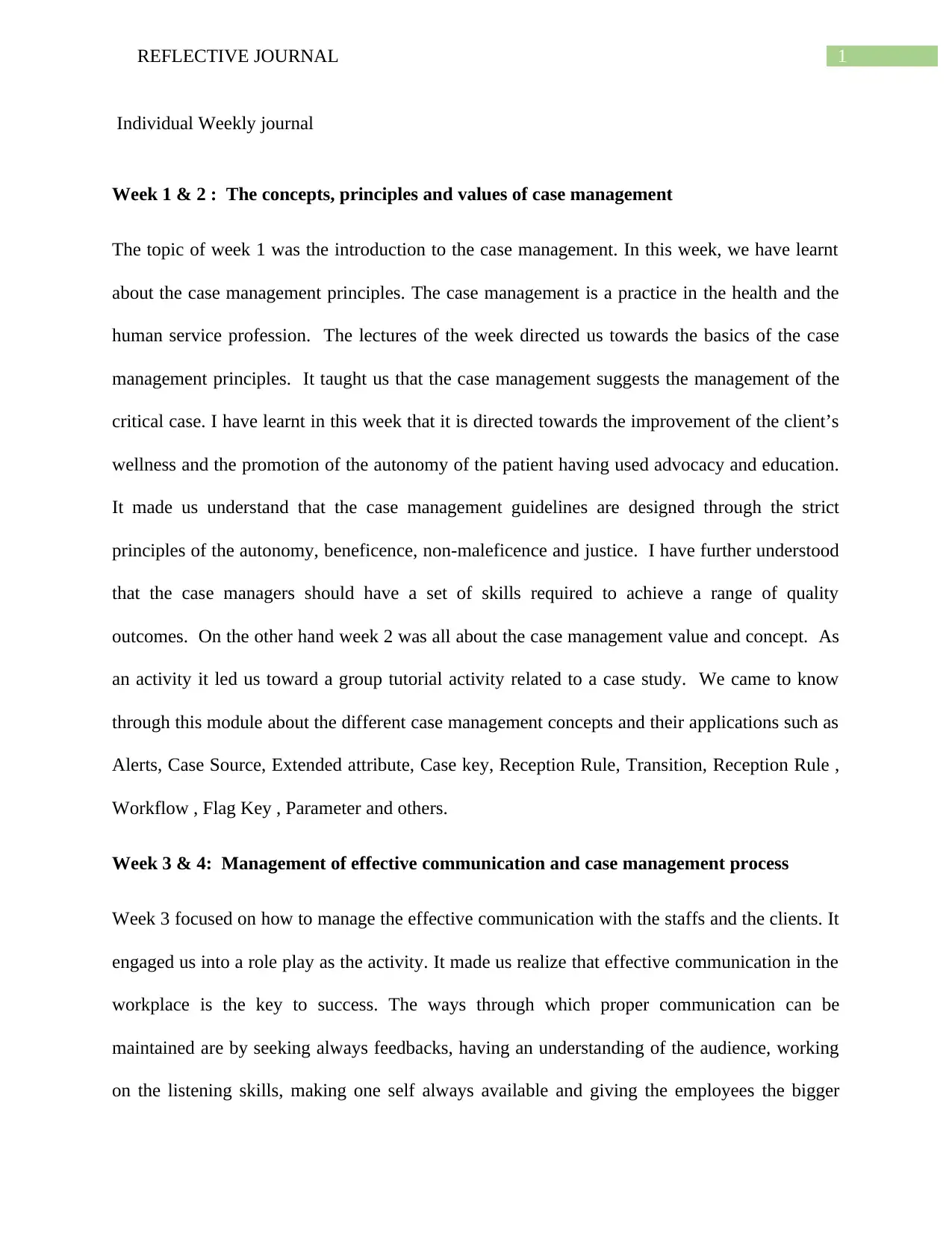
1REFLECTIVE JOURNAL
Individual Weekly journal
Week 1 & 2 : The concepts, principles and values of case management
The topic of week 1 was the introduction to the case management. In this week, we have learnt
about the case management principles. The case management is a practice in the health and the
human service profession. The lectures of the week directed us towards the basics of the case
management principles. It taught us that the case management suggests the management of the
critical case. I have learnt in this week that it is directed towards the improvement of the client’s
wellness and the promotion of the autonomy of the patient having used advocacy and education.
It made us understand that the case management guidelines are designed through the strict
principles of the autonomy, beneficence, non-maleficence and justice. I have further understood
that the case managers should have a set of skills required to achieve a range of quality
outcomes. On the other hand week 2 was all about the case management value and concept. As
an activity it led us toward a group tutorial activity related to a case study. We came to know
through this module about the different case management concepts and their applications such as
Alerts, Case Source, Extended attribute, Case key, Reception Rule, Transition, Reception Rule ,
Workflow , Flag Key , Parameter and others.
Week 3 & 4: Management of effective communication and case management process
Week 3 focused on how to manage the effective communication with the staffs and the clients. It
engaged us into a role play as the activity. It made us realize that effective communication in the
workplace is the key to success. The ways through which proper communication can be
maintained are by seeking always feedbacks, having an understanding of the audience, working
on the listening skills, making one self always available and giving the employees the bigger
Individual Weekly journal
Week 1 & 2 : The concepts, principles and values of case management
The topic of week 1 was the introduction to the case management. In this week, we have learnt
about the case management principles. The case management is a practice in the health and the
human service profession. The lectures of the week directed us towards the basics of the case
management principles. It taught us that the case management suggests the management of the
critical case. I have learnt in this week that it is directed towards the improvement of the client’s
wellness and the promotion of the autonomy of the patient having used advocacy and education.
It made us understand that the case management guidelines are designed through the strict
principles of the autonomy, beneficence, non-maleficence and justice. I have further understood
that the case managers should have a set of skills required to achieve a range of quality
outcomes. On the other hand week 2 was all about the case management value and concept. As
an activity it led us toward a group tutorial activity related to a case study. We came to know
through this module about the different case management concepts and their applications such as
Alerts, Case Source, Extended attribute, Case key, Reception Rule, Transition, Reception Rule ,
Workflow , Flag Key , Parameter and others.
Week 3 & 4: Management of effective communication and case management process
Week 3 focused on how to manage the effective communication with the staffs and the clients. It
engaged us into a role play as the activity. It made us realize that effective communication in the
workplace is the key to success. The ways through which proper communication can be
maintained are by seeking always feedbacks, having an understanding of the audience, working
on the listening skills, making one self always available and giving the employees the bigger
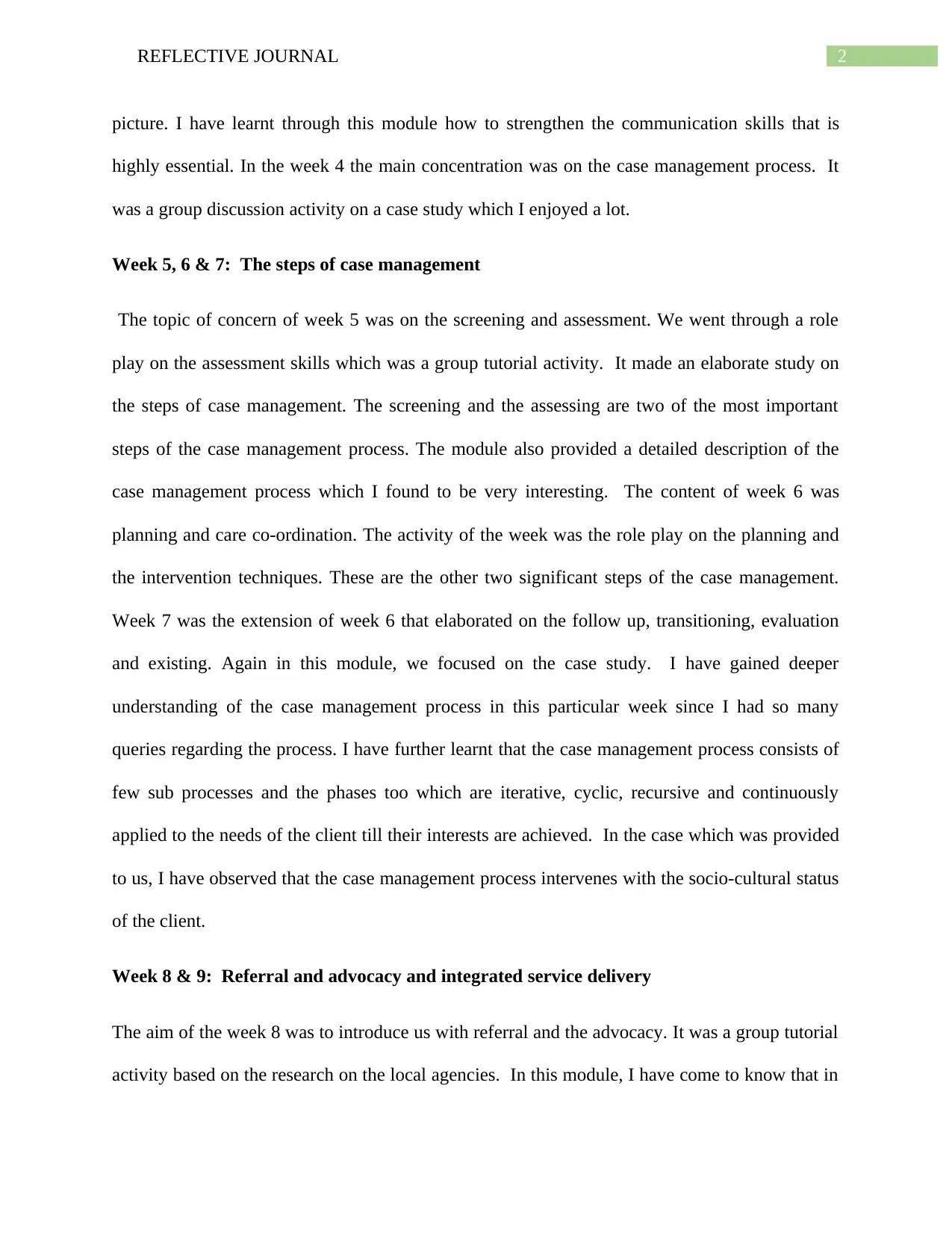
2REFLECTIVE JOURNAL
picture. I have learnt through this module how to strengthen the communication skills that is
highly essential. In the week 4 the main concentration was on the case management process. It
was a group discussion activity on a case study which I enjoyed a lot.
Week 5, 6 & 7: The steps of case management
The topic of concern of week 5 was on the screening and assessment. We went through a role
play on the assessment skills which was a group tutorial activity. It made an elaborate study on
the steps of case management. The screening and the assessing are two of the most important
steps of the case management process. The module also provided a detailed description of the
case management process which I found to be very interesting. The content of week 6 was
planning and care co-ordination. The activity of the week was the role play on the planning and
the intervention techniques. These are the other two significant steps of the case management.
Week 7 was the extension of week 6 that elaborated on the follow up, transitioning, evaluation
and existing. Again in this module, we focused on the case study. I have gained deeper
understanding of the case management process in this particular week since I had so many
queries regarding the process. I have further learnt that the case management process consists of
few sub processes and the phases too which are iterative, cyclic, recursive and continuously
applied to the needs of the client till their interests are achieved. In the case which was provided
to us, I have observed that the case management process intervenes with the socio-cultural status
of the client.
Week 8 & 9: Referral and advocacy and integrated service delivery
The aim of the week 8 was to introduce us with referral and the advocacy. It was a group tutorial
activity based on the research on the local agencies. In this module, I have come to know that in
picture. I have learnt through this module how to strengthen the communication skills that is
highly essential. In the week 4 the main concentration was on the case management process. It
was a group discussion activity on a case study which I enjoyed a lot.
Week 5, 6 & 7: The steps of case management
The topic of concern of week 5 was on the screening and assessment. We went through a role
play on the assessment skills which was a group tutorial activity. It made an elaborate study on
the steps of case management. The screening and the assessing are two of the most important
steps of the case management process. The module also provided a detailed description of the
case management process which I found to be very interesting. The content of week 6 was
planning and care co-ordination. The activity of the week was the role play on the planning and
the intervention techniques. These are the other two significant steps of the case management.
Week 7 was the extension of week 6 that elaborated on the follow up, transitioning, evaluation
and existing. Again in this module, we focused on the case study. I have gained deeper
understanding of the case management process in this particular week since I had so many
queries regarding the process. I have further learnt that the case management process consists of
few sub processes and the phases too which are iterative, cyclic, recursive and continuously
applied to the needs of the client till their interests are achieved. In the case which was provided
to us, I have observed that the case management process intervenes with the socio-cultural status
of the client.
Week 8 & 9: Referral and advocacy and integrated service delivery
The aim of the week 8 was to introduce us with referral and the advocacy. It was a group tutorial
activity based on the research on the local agencies. In this module, I have come to know that in
⊘ This is a preview!⊘
Do you want full access?
Subscribe today to unlock all pages.

Trusted by 1+ million students worldwide
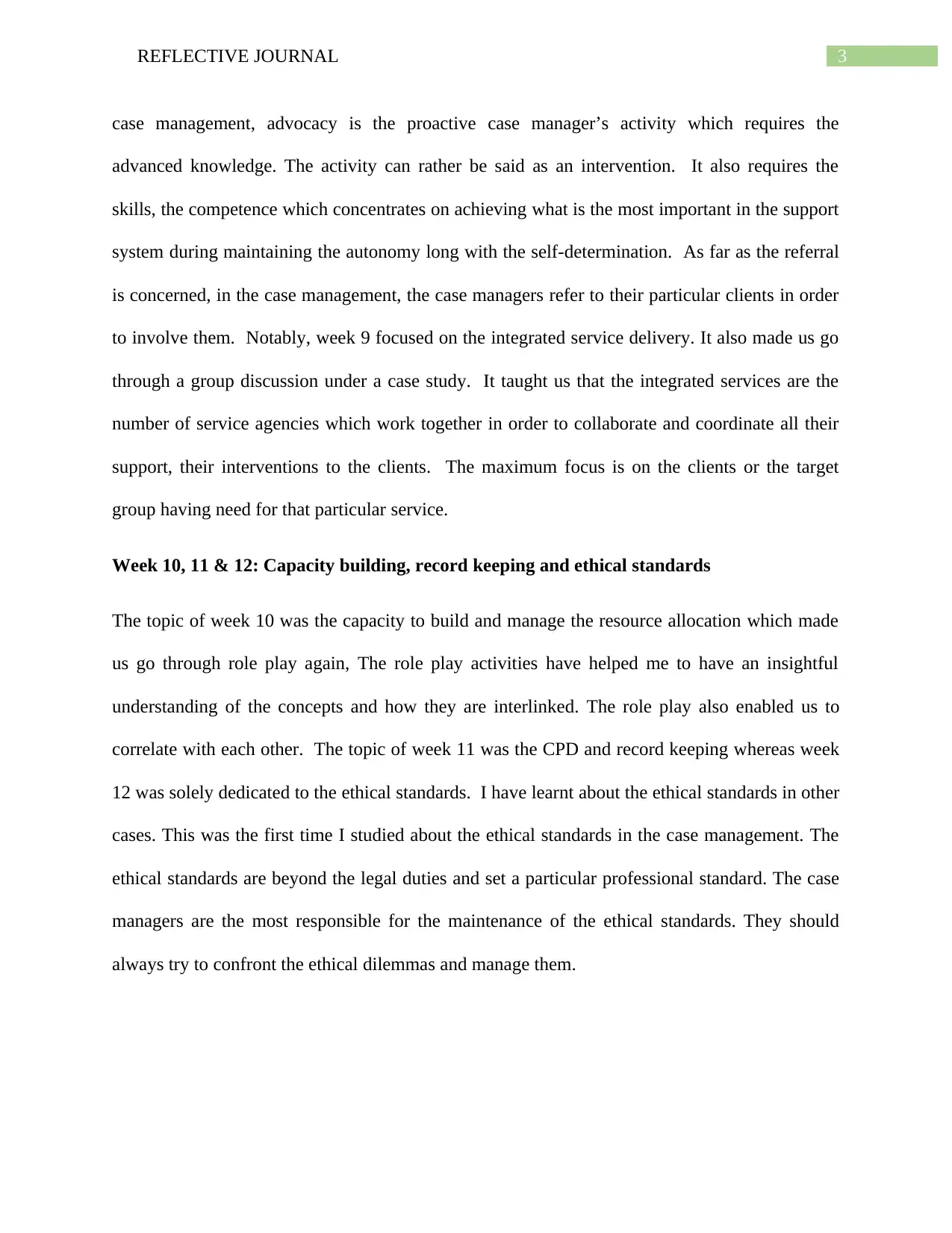
3REFLECTIVE JOURNAL
case management, advocacy is the proactive case manager’s activity which requires the
advanced knowledge. The activity can rather be said as an intervention. It also requires the
skills, the competence which concentrates on achieving what is the most important in the support
system during maintaining the autonomy long with the self-determination. As far as the referral
is concerned, in the case management, the case managers refer to their particular clients in order
to involve them. Notably, week 9 focused on the integrated service delivery. It also made us go
through a group discussion under a case study. It taught us that the integrated services are the
number of service agencies which work together in order to collaborate and coordinate all their
support, their interventions to the clients. The maximum focus is on the clients or the target
group having need for that particular service.
Week 10, 11 & 12: Capacity building, record keeping and ethical standards
The topic of week 10 was the capacity to build and manage the resource allocation which made
us go through role play again, The role play activities have helped me to have an insightful
understanding of the concepts and how they are interlinked. The role play also enabled us to
correlate with each other. The topic of week 11 was the CPD and record keeping whereas week
12 was solely dedicated to the ethical standards. I have learnt about the ethical standards in other
cases. This was the first time I studied about the ethical standards in the case management. The
ethical standards are beyond the legal duties and set a particular professional standard. The case
managers are the most responsible for the maintenance of the ethical standards. They should
always try to confront the ethical dilemmas and manage them.
case management, advocacy is the proactive case manager’s activity which requires the
advanced knowledge. The activity can rather be said as an intervention. It also requires the
skills, the competence which concentrates on achieving what is the most important in the support
system during maintaining the autonomy long with the self-determination. As far as the referral
is concerned, in the case management, the case managers refer to their particular clients in order
to involve them. Notably, week 9 focused on the integrated service delivery. It also made us go
through a group discussion under a case study. It taught us that the integrated services are the
number of service agencies which work together in order to collaborate and coordinate all their
support, their interventions to the clients. The maximum focus is on the clients or the target
group having need for that particular service.
Week 10, 11 & 12: Capacity building, record keeping and ethical standards
The topic of week 10 was the capacity to build and manage the resource allocation which made
us go through role play again, The role play activities have helped me to have an insightful
understanding of the concepts and how they are interlinked. The role play also enabled us to
correlate with each other. The topic of week 11 was the CPD and record keeping whereas week
12 was solely dedicated to the ethical standards. I have learnt about the ethical standards in other
cases. This was the first time I studied about the ethical standards in the case management. The
ethical standards are beyond the legal duties and set a particular professional standard. The case
managers are the most responsible for the maintenance of the ethical standards. They should
always try to confront the ethical dilemmas and manage them.
Paraphrase This Document
Need a fresh take? Get an instant paraphrase of this document with our AI Paraphraser
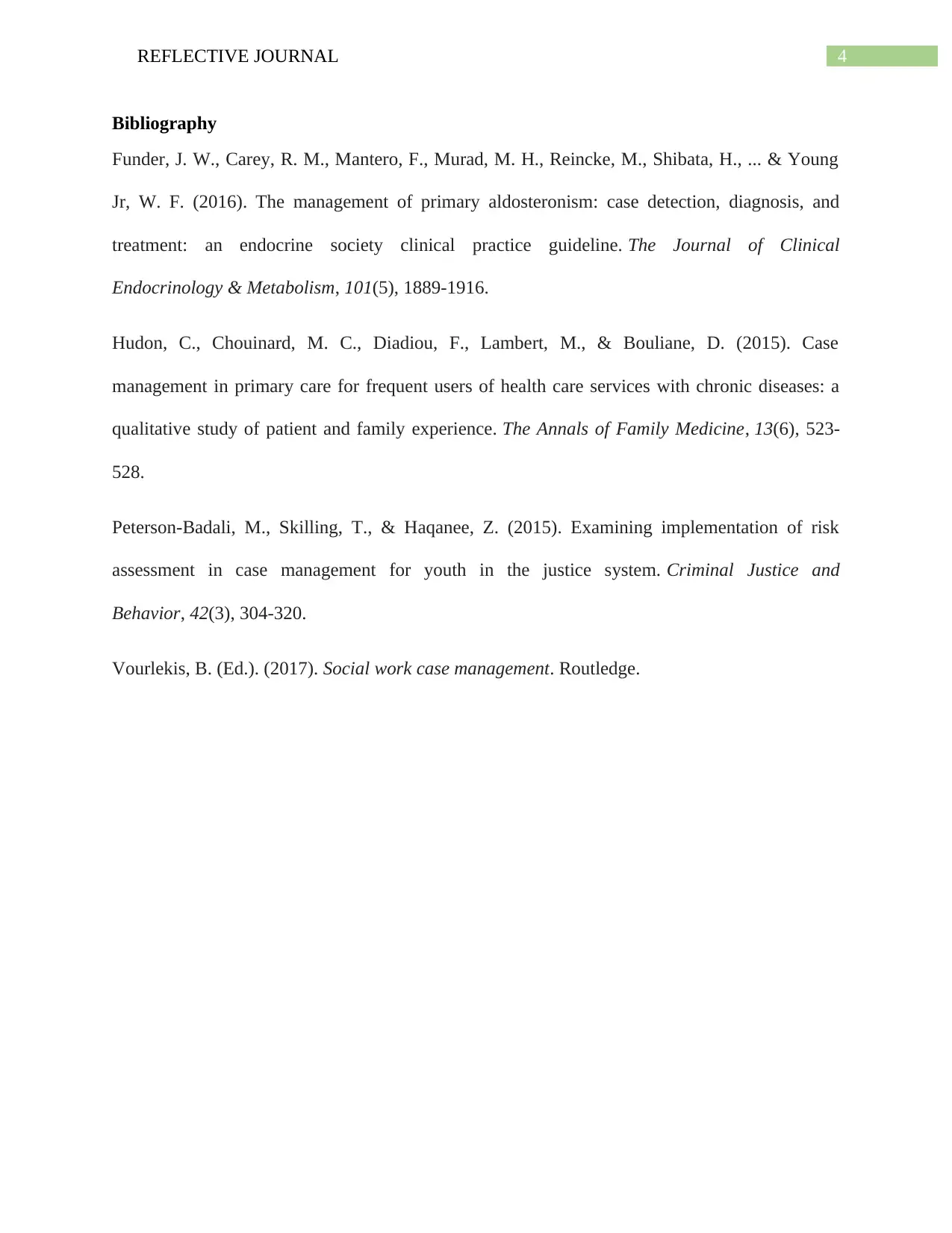
4REFLECTIVE JOURNAL
Bibliography
Funder, J. W., Carey, R. M., Mantero, F., Murad, M. H., Reincke, M., Shibata, H., ... & Young
Jr, W. F. (2016). The management of primary aldosteronism: case detection, diagnosis, and
treatment: an endocrine society clinical practice guideline. The Journal of Clinical
Endocrinology & Metabolism, 101(5), 1889-1916.
Hudon, C., Chouinard, M. C., Diadiou, F., Lambert, M., & Bouliane, D. (2015). Case
management in primary care for frequent users of health care services with chronic diseases: a
qualitative study of patient and family experience. The Annals of Family Medicine, 13(6), 523-
528.
Peterson-Badali, M., Skilling, T., & Haqanee, Z. (2015). Examining implementation of risk
assessment in case management for youth in the justice system. Criminal Justice and
Behavior, 42(3), 304-320.
Vourlekis, B. (Ed.). (2017). Social work case management. Routledge.
Bibliography
Funder, J. W., Carey, R. M., Mantero, F., Murad, M. H., Reincke, M., Shibata, H., ... & Young
Jr, W. F. (2016). The management of primary aldosteronism: case detection, diagnosis, and
treatment: an endocrine society clinical practice guideline. The Journal of Clinical
Endocrinology & Metabolism, 101(5), 1889-1916.
Hudon, C., Chouinard, M. C., Diadiou, F., Lambert, M., & Bouliane, D. (2015). Case
management in primary care for frequent users of health care services with chronic diseases: a
qualitative study of patient and family experience. The Annals of Family Medicine, 13(6), 523-
528.
Peterson-Badali, M., Skilling, T., & Haqanee, Z. (2015). Examining implementation of risk
assessment in case management for youth in the justice system. Criminal Justice and
Behavior, 42(3), 304-320.
Vourlekis, B. (Ed.). (2017). Social work case management. Routledge.
1 out of 5
Related Documents
Your All-in-One AI-Powered Toolkit for Academic Success.
+13062052269
info@desklib.com
Available 24*7 on WhatsApp / Email
![[object Object]](/_next/static/media/star-bottom.7253800d.svg)
Unlock your academic potential
Copyright © 2020–2026 A2Z Services. All Rights Reserved. Developed and managed by ZUCOL.





